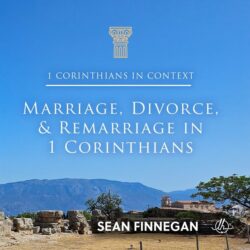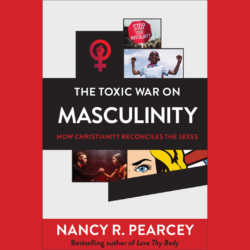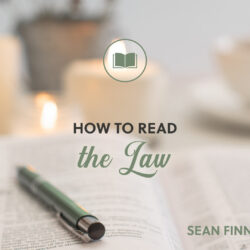Divorce is a painful and complicated subject to talk about in America today where about half of all marriages end in divorce. Our laws have changed to accept “no-fault” divorce and many of us are unaware of what the bible teaches on this critical subject. To figure out the biblical perspective on divorce and remarriage, we will consider three scriptures from the Old Testament (Mal 2.13-16; Deut 22.13-21; 24.1-4) and three from the New (Mat 5.31-32; 19.3-12; 1 Cor 7.10-40). We’ll give particular focus to the reasons that allow for divorce both in Deuteronomy as well as how Jesus interpreted it when he was asked about it.
—— Notes ——
To figure out the biblical perspective on divorce and remarriage, we will consider three Scriptures from the Old Testament (Mal 2:13-16; Deut 22:13-21; 24:1-4) and three from the New Testament (Mat 5:31-32; 19:3-12; 1 Cor 7:10-40). Although other verses touch on this subject, the constraints of time limit what we can consider here. Other texts include: Lev 21:7, 14; 22:13; Num 30:9; Is 50:1; Jer 3:8; Hos 2:2; Mat 1:19; Mark 10:2-12; Luke 16:18.
Malachi 2:13-16 13 In antiquity, divorced women had limited options. A man could get rid of “the wife of his youth” and upgrade to a younger wife. God takes a strong stand on this. He will not accept the offerings of a man who has done this. He hates divorce.[1]
Deuteronomy 22:13-21 This law protects the virtuous woman from getting divorced. If her husband falsely accuses her of pre-marital sex, he will get whipped, fined, and barred from divorcing her henceforth. If she’s guilty, she’ll suffer capital punishment, a harsh ruling by our standards. Even so, this shows how seriously they treated pre-marital sex and virginity.
Deuteronomy 24:1-4 Providing a divorced woman with a certificate of divorce (today called “a get”) was a huge step forward for women. It meant she was legally free and could remarry. This law specifically prohibited remarrying a woman who had an intervening marriage with someone else, but our interest is more on the reason for the initial divorce.
The Hebrew word in question is עֶרְוַת (ervat), the word for “nakedness.”[2]
| Translation | ervat davar |
| ESV/NASB | some indecency |
| JPS (1988) | something obnoxious |
| KJV | some uncleanness |
| NET | something offensive |
| NRSV | something objectionable |
The rabbis argued over what ervat precisely meant. From the Babylonian Talmud, we gather three perspectives: Hillel, Shammai, and Akiva. Hillel (110 – 10 BC) died before Jesus was born, Shammai (50 BC – AD 30) overlapped with Jesus, and Akiva (AD 50 – 132) was born a generation after Jesus. Here are their positions on divorce:
Tractate Gittin 90a
Mishnah. The house of Shammai says: a man should not divorce his wife unless he has found her guilty of some unseemly conduct, as it says, because he has found some unseemly thing in her. The house Hillel, however, says [that he may divorce her] even if she has merely spoiled his food, since it says, because he hath found some unseemly thing in her. Rabbi Akiva says, [he may divorce her] even if he finds another woman more beautiful than she is, as it says, it comes to pass, if she find no favor in his eyes.
| Shammai | some unseemly conduct |
| Hillel | spoiled his food |
| Akiva | finds another more attractive |
How did Jesus compare to these other rabbis from this period?
Matthew 5:31-32
31 “It was also said, ‘Whoever divorces his wife, let him give her a certificate of divorce.’ 32 But I say to you that everyone who divorces his wife, except on the ground of sexual immorality, makes her commit adultery, and whoever marries a divorced woman commits adultery.
Here Jesus quotes Deuteronomy and takes a stricter position. He limits divorce to the grounds of sexual immorality (porneia). Who is Jesus most like: Hillel, Shammai, or Akiva? In fact, he seems stricter than all three!
An important key for interpreting Jesus’ exception clause here is to get clear on what adultery is. Of course, adultery is when one or both of those involved are married to someone else. How can a divorced woman commit adultery? If she’s no longer married, then it’s impossible for her to commit adultery (assuming the other person is not married). In fact, the only way she could be guilty of adultery is if she is still (in some sense) married.
To this day, Orthodox Jews have a similar idea:
Judaism 101 Website
“It is important to note that a civil divorce is not sufficient to dissolve a Jewish marriage. As far as Jewish law is concerned, a couple remains married until the woman receives the get. This has been a significant problem: many liberal Jews have a religiously valid marriage, yet do not obtain a religiously valid divorce. If the woman remarries after such a procedure, her second marriage is considered an adulterous one, and her children are considered mamzerim (bastards, illegitimate).”[3]
Before getting too detailed, let’s consider a second saying of Jesus on this important subject:
Matthew 19:3-9 The Pharisees want to know what Jesus thinks about divorcing for “any cause.” (This sounds suspiciously like our “no fault” divorce today.) Jesus grounds his thinking about marriage in creation theology (Gen 2:24). God joins together two people once they have come together in marriage. Jesus rebuffs the Pharisees for thinking they can divide what God united.
Naturally, they come back at him with the statute from Deuteronomy 24:1. Essentially, they’re asking, “What about ervat?” Jesus explains the difference between commanding and permitting: God permitted divorce, but He did not command it. Like the Sermon on the Mount, Jesus clarifies that ervat (translated “indecency” in ESV and NASB) is porneia, translated “sexual immorality” (ESV), “unchastity” (NRSV), or “fornication” (KJV).
Three Main Options for Interpreting Porneia [4]
- Adultery
- Premarital sex (Deut 22)
- Incest (Lev 18)
Honest-hearted Christians take all three of these positions. Richard Hays helpfully explains a more comprehensive understanding, based on the broad meaning of the word porneia:
Finally, any interpretation of the exception clause must do justice to the very general meaning of porneia in contemporary Greek usage: it is a generic term for all sorts of sexual misconduct. Unless the immediate context provides some good reason for limiting its sphere of application, it ought to be construed as a catch-all term, not as a terminus technicus for one specific offense. Thus, the best interpretation is that the Matthean exception clause leaves the door open for divorce on the grounds of a variety of offenses related to sexual immorality…The new element here, however, is the assertion that the man who divorces his wife makes her into an adulteress and that the person who marries a legally divorced woman also is committing adultery. Presumably, the logic is that a certificate of divorce has no real effect; the marriage remains in force. If the divorced woman remarries—as she might have to do for legal and economic protection—she will thereby de facto commit adultery against the original husband who dismissed her, and the man who marries her will also be committing adultery against the first husband. The effect of this teaching is to declare the Deuteronomic divorce law null and void except in cases of porneia. [5]
When it comes to remarriage, once again, sincere Christians hold a couple of different positions. Some argue that porneia allows for divorce, but not remarriage, while others see remarriage as a possibility. Here it’s important to remember, Jesus’ point was that a remarried person commits adultery. However, if the divorce is legitimate, then adultery is not a concern. In other words, if the marriage is dissolved, you can’t commit adultery (at least not on your end).[6]
Putting together Jesus’ teachings in the Gospels yields the following:[7]
- A husband who divorces his wife (except for porneia) makes her commit adultery (Mat 5:32)
- A man who marries a divorced woman commits adultery (Mat 5:32)[8]
- A husband who divorces his wife (except for porneia) commits adultery (Mat 19:9) against her (Mark 10:11)
- A wife who divorces her husband and remarries commits adultery (Mark 10:12)
Matthew 19:10-12 Look at the disciples’ response! They’re shocked by Jesus’ teaching. Jesus recognizes that marriage is not for everyone. Here Jesus delineates three kinds of eunuchs:
- Someone who cannot have intercourse because of a birth defect
- Someone castrated or injured by others
- Someone who chooses to live chastely for the sake of the Kingdom
Now, let’s examine the third major New Testament Scripture on divorce and remarriage.
1 Corinthians 7:10-17, 27, 39-40 Here the Apostle Paul quotes Jesus to the effect that one should not separate/divorce, but if she does, she should either remain unmarried or be reconciled. However, in Corinth, we have a new social context with mixed marriages. If someone becomes a Christian, should they get a divorce or stay married to an unbelieving spouse? The answer is he or she should stay married so long as their spouse will consent. Furthermore, he explains that the holiness of the saint spreads to the children! However, if the unbeliever separates, let him/her go. It’s important to notice that this does not overturn what Jesus said or what we read in verse 11. Throughout this chapter (as we’ll see later), Paul emphasizes the benefits of singleness and strongly encourages believers to consider this option.
Now that we have a general idea of what Scripture teaches on this subject, let’s consider the New York state law:
Wikipedia:
“By 1977, nine states had adopted no-fault divorce laws,[30] and by late 1983, every state but South Dakota and New York had adopted some form of no-fault divorce (although some forms were not as easy to obtain as that in California).[37] South Dakota adopted no-fault divorce in 1985.[38] Until August 2010, New York still lacked a unilateral no-fault divorce statute; under New York divorce law, only if both parties notarized a separation agreement and lived separately for one year could a judge convert it into a divorce. New York governor David Paterson signed a no-fault divorce bill on August 15, 2010. As of October 2010, no-fault divorce is allowed in all fifty states and the District of Columbia.”[9]
No-fault divorce is when you can get a divorce without proving one of the two is at fault. You don’t have to breach the marriage contract to get a divorce. A traditional divorce required one of the spouses to prove infidelity, abandonment, abuse, cruelty, etc. Compared to what we see today, Jesus’ words are startling and controversial. But remember, his own contemporaries (two thousand years ago) found his teaching on divorce and remarriage surprising too. We cannot go against what the Bible says if our goal is to practice biblical sexual ethics. We dare not call Jesus “Lord” and refuse to obey his words (Luke 6:46). Of course, there are many situations and specifics that challenge us today in our broken world. For each, we want to remain as faithful as possible to the Bible without abandoning compassion and becoming Pharisees ourselves.
Our culture projects a very different perspective on marriage than the Bible. It’s important to set realistic expectations prior to getting married. Stanley Hauerwas explains:
“Destructive to marriage is the self-fulfillment ethic that assumes marriage and the family are primarily institutions of personal fulfillment, necessary for us to become “whole” and happy. The assumption is that there is someone just right for us to marry and that if we look closely enough we will find the right person. The moral assumption overlooks a crucial aspect to marriage. It fails to appreciate the fact that we always marry the wrong person. We never know whom we marry; we just think we do. Or even if we first marry the right person, just give it a while, and he or she will change. For marriage, being [the enormous thing it is] means we are not the same person after we have entered it. The primary problem is…learning how to love and care for the stranger to whom you find yourself married.”[10]
To the married, it’s important to protect and invest in your relationship over time. In particular, handling conflict is one of the most difficult, but important, aspects of maintaining a Christian marriage. John Gottman claims he can predict if a marriage will divorce with 91% certainty based on a five minute video of watching how a couple handles conflict. After decades of research, he’s identified four behaviors that destroy a marriage:
Four Horsemen of the Marriage Apocalypse:[11]
- Contempt: the feeling that a person or a thing is beneath consideration, worthless, or deserving scorn (i.e. rolling eyes)
- Criticism: any time you say, “What’s wrong with you?” and attack the person rather than discussing behavior; using always and never
- Defensiveness: getting upset because of someone’s perceived attack; counter-attack instead of accepting responsibility
- Stonewalling: refusing to engage the issue at all (especially, as a way of punishing the other)
Avoiding these pitfalls and adopting a tenacious commitment-oriented mindset should help you work through issues as they arise. In the end, Christian marriage is an intensified form of loving your neighbor as yourself.
[1] Some translations (i.e. ESV) translate this “For the man who does not love his wife but divorces her…” instead of “For I hate divorce….” The NET textual commentary note is helpful here: “The verb ) שָׂנֵאsane‘( appears to be a third person form, “he hates,” which makes little sense in the context, unless one emends the following word to a third person verb as well. Then one might translate, “he [who] hates [his wife] [and] divorces her…is guilty of violence.” A similar translation is advocated by M. A. Shields, “Syncretism and Divorce in Malachi 2, 10–16,” ZAW 111 (1999): 81-85. However, it is possible that the first person pronoun ) אָנֹכִי’anokhi, “I”( has accidentally dropped from the text after ) כִּיki(. If one restores the pronoun, the form שָׂנֵא can be taken as a participle and the text translated, “for I hate” )so NAB, NASB, NRSV, NLT(.” Even if God hates divorce, as we’ll see, that doesn’t mean He forbids it entirely.
[2] The BDB glosses עֶרְוַת as “nakedness, pudenda.” Brown, Driver, and Briggs, The Brown-Driver-Briggs Hebrew and English Lexicon, (Oxford: Clarendon Press 1907).
[3] Tracey Rich, “Divorce” on Judaism 101, http://www.jewfaq.org/divorce.htm, accessed January 31, 2017.
[4] For a variety of Christian perspectives on this issue, see chapter 15 of Richard Hays, The Moral Vision of the New Testament (NY: Harper One, 1996), chapter 15 of Norman Geisler, Christian Ethics: Options and Issues (Grand Rapids: Baker Books, 1989, reprinted 2002), and chapter 14 of Glen Stassen and David Gushee, Kingdom Ethics (Downers Grove, IL: IVP Academic, 2003).
[5] Richard Hays, The Moral Vision of the New Testament (NY: Harper One, 1996), p. 355-6.
[6] Hays explains: “It is sometimes argued that this teaching prohibits all remarriage after divorce, even in situations where divorce is permitted because of porneia. Strictly speaking, however, there is nothing in the saying to prevent a man who has divorced his wife on the ground of porneia from remarrying, as long as he marries a woman who has not previously been married” (Hays, p. 357).
[7] I don’t include Luke 16:18 here since it duplicates what we already find in Matthew and Mark.
[8] Presumably, this woman was not divorced on the grounds of porneia; for if she were, she would not be able to commit adultery, because her divorce would be valid in God’s eyes.
[9] https://en.wikipedia.org/wiki/No-fault_divorce#The_adoption_of_no-fault_divorce_laws_by_the_other_states
[10] Stanley Hauerwas, “Sex and Politics,” Christian Century April 19, 1978, pp. 417-422, as cited by Tim Keller, The Meaning of Marriage (New York: Penguin Group, 2011), pp. 32-3.
[11] Ellie Lisitsa, “The Four Horsemen: Criticism, Contempt, Defensiveness, and Stonewalling,” The Gottman Relationship Blog, The Gottman Institute, April 24, 2013, https://www.gottman.com/blog/the-four-horsemen-recognizing-criticism-contempt-defensiveness-and-stonewalling/, accessed on January 31, 2017.
—— Links ——
- More Restitutio podcasts and posts on marriage
- Attend Living Hope’s upcoming marriage conference (Nov 3-5, 2017)
- Intro music: “District Four” by Kevin MacLeod. Licensed under Creative Commons: By Attribution 3.0 License.








Hello Sean, I loved your discussion around the christian view of divorce. Using Jesus own words leaves us in no doubt. You have shown christian courage to re-state the proper terms of a Christians view towards marriage and divorce.
Unfortunately most of the Mega Churches including many of the mainstream churches are silent on this important matter. Probably because this would be a subject that would prove to be most unpopular with their’ followers! Unfortunately, the statistics you quoted on the percentages of couples who divorce, and for the reasons why, are certainly not limited to non Christians. I think, from my observations, the statistics are probably equally distributed among those who claim to be Christian and those who do not claim to be Christian. Also there is no need to be apologetic for stating these facts from the scriptures that are unequivocal. We do no favors for those who earnestly, are seeking the Kingdom and to please the lord, by being silent or diluting this very important teaching of Jesus and Gods word. Hebrews 13:4 states .”Marriage is to be held in honor among all, and the marriage bed is to be undefiled; for God will judge fornicators, and adulterers God will judge. (NASB)
Keep up the good work I always look forward to the next installment and I find it very encouraging, God bless you and everyone else at Restitutio land.
Hey Sean,
Bold post and podcast, as even you mentioned at the end you received some flak from members. I avoided this topic for years due to uncertainty on the topic. I kept my mouth shut to those who were divorced. And while I do think you did some study on this—I think you need to go a bit deeper. Mainly, translation inconsistencies in the NT with Jesus’ words. It has been a long time since I’ve really delved into the topic so I will not point out in detail these translation issues, but they mainly have to do with the terms “send away” and “divorce” usually referring to separate things. It follows along the lines of the Orthodox Jewish lady you quoted… I think this is exactly what Jesus was concerned with in his remarks about holding the religious leaders accountable for the woman’s adultery.
Basically, I take a different foundation than you from my studies… and that is that I believe Jesus kept the Torah and taught it as it was meant to be followed/believed/understood. That means, I don’t believe Matthew 5-7 is at all a correction, update, or any other term one wants to use to show a belief that Jesus improved upon or contradicted Moses.
I believe many of those “You have heard it *said*…” proves it. Jesus said “It is written…” when quoting from my knowledge. So in Matthew 5 Jesus’ concern from my understanding as someone who would not break the Torah(as in teaching against it, since it’s his own God’s laws) since he was sinless was not the Torah, but the mis-teaching/mis-handling of it by the religious leaders. Hence “You have heard it *said*…” by them, the religious leadership.
The next issue mentioned above shows a translation difficulty with “send away” and “divorce.” They are not normally used interchangeably throughout Scripture. It doesn’t make sense to say “Whoever divorces his wife, let him give her a certificate of divorce.” It should say “Whoever sends away his wife, let him give her a certificate of divorce.” As you found in your studies it was that certificate that made legitimate the divorce legally. But if one was wicked, they could just send away their wife without a divorce certificate. That would in essence be about the same as modern day “separation” in a marriage. So, they’re still married. So if the woman marries another man, she’s an adulterer. Jesus was saying God was going to hold the HUSBAND accountable though for not keeping the Torah properly setting her up for adultery. The reason this doesn’t work the other way though is because polygamy is not against the Torah. That’s another topic, but a man could marry multiple women so he wouldn’t need a divorce certificate. He wouldn’t be in adultery in that case normally.
But without great detail of the word study I know you shouldn’t accept my objection at face value. I would highly suggest if you would, give a listen to what fellow bibilical unitarian Matthew Janzen has to say on his sermons. He does get off topic a few times and we may have other disagreements with him but he did a good study on the subject of divorce and remarriage in my opinion. I’d encourage a listen just to give yourself a little bit deeper challenge.
It’s on this sermon website, http://mnc.buzzsprout.com/
but you’ll have to scroll waaaaay down to get to numbers #79 – #84 to get the full thing. You can download them there. I know you’re busy and this was only a 45 minute presentation, so you may have looked further and just didn’t get into it but I hope you can find the time to hear him out.